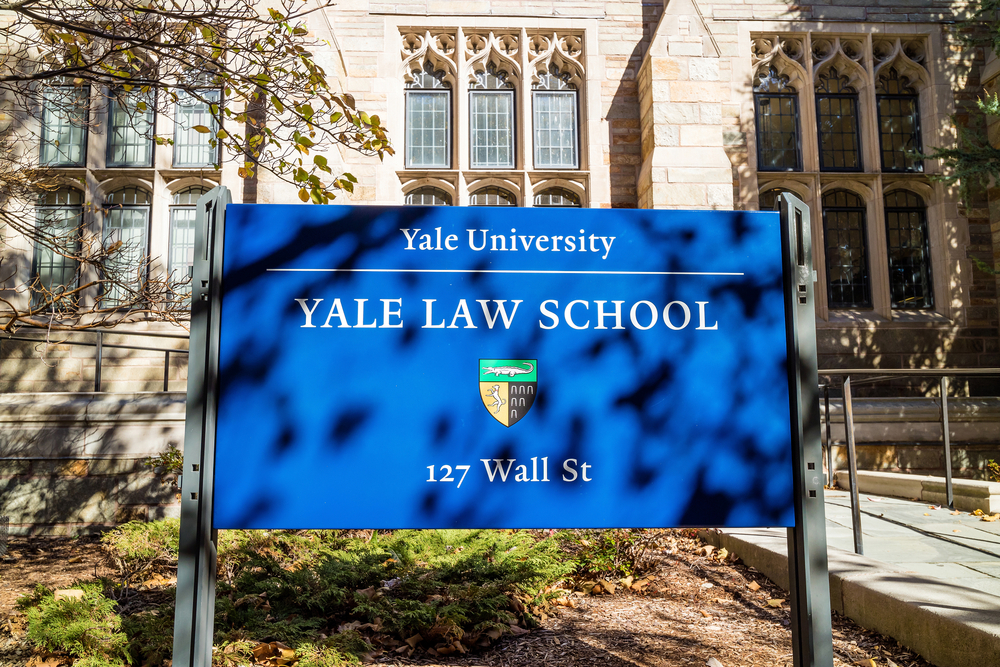2 students sue Yale and law school administrators, alleging retaliation

Yale Law School. Photo from Shutterstock.
In a federal court complaint that includes allegations of vendettas, gossip and lies, two unnamed Yale Law School students claim they were blackballed from job opportunities because they refused to lie for the university's investigation involving a law professor of color.
The professor is Amy Chua, according to the complaint. Some wonder if the filing is a tactic to try and discredit the law school’s dean, Heather Gerken, who is named as a defendant, Yale Daily News reports. Gerken has a five-year appointment that began in 2017, so her deanship will soon be up for review.
Besides Gerken, Ellen Cosgrove, an associate dean, and Yaseen Eldik, who the lawsuit describes as the school’s director of equity, diversity and inclusion, are named as defendants. The complaint, filed Monday in the U.S. District Court for the District of Connecticut, alleges breach of contract, defamation and intentional infliction of emotional distress. It seeks $75,000 in damages.
Chua and her husband, fellow Yale law professor Jed Rubenfeld, in 2018 were accused of telling women seeking clerkships with Brett Kavanaugh that the judge preferred candidates who looked like models, the Guardian reported at the time, when Kavanaugh was a U.S. Supreme Court nominee. Chua denied the allegations. In 2020, New York Magazine’s Intelligencer reported that Rubenfeld received a two-year suspension for sexual harassment, and that on his return to Yale, he would be barred from teaching small-group and required courses and be restricted at social gatherings with students. He told the publication he never sexually harassed anyone.
A 2020 case study compiled by Yale Law Women Board representatives and the law school’s Title IX Working Group asked that Rubenfeld be removed permanently from the institution.
“We do not want Jed Rubenfeld to prey on a new generation of students,” the authors wrote.
Then, in June 2021, the New York Times reported that in 2019, Chua agreed not to drink or socialize with students outside of class.
The federal lawsuit identifies the plaintiffs as a Black female who is on a voluntary leave of absence and an Asian male in his third year. They wanted to meet with Chua, who is also Asian, in person, privately, to discuss an alleged lack of institutional support at the law school for students of color. According to the plaintiffs, another law student created a “dossier” about them, detailing “secret dinner parties” they had with Chua and federal judges.
“John and Jane met Chua twice at her home, in February 2021 and March 2021. Both meetings included only John, Jane, and Chua, and no meals were involved,” the complaint states.
The plaintiffs became aware of the dossier in April 2021, and around the same time, Yale Law School administration pressured them both to make false statements for a formal complaint against Chua, according to the lawsuit. Because they would not, the action alleges, administration told an unnamed professor he should not hire the students as “Coker fellows,” which involve 3L teaching assistant positions.
Also, the plaintiffs allege administration threatened that the dossier would be seen by judges.
“Despite being otherwise compelling applicants for judicial clerkships, neither Jane nor John applied for clerkships, fearing that the administration would make good on its threats to ensure that every judge sees the dossier,” the complaint states.
Karen Peart, director of Yale University media relations, described the lawsuit allegations as “legally and factually baseless” in an email. Chua wrote in an email that she is not participating in media inquiries. She told the Yale Daily News that the issue in the students’ lawsuit was “absolutely not about me.” Chua also said she’s trying to put the situation behind her and wishes it would go away.
Brett Sokolow, who advises colleges on Title IX issues, says he has seen university administrators pressure witnesses to testify in a certain way. But that’s rare, adds Sokolow, who doesn’t see how the plaintiffs in the action have standing.
“Who benefits from filing such a weak lawsuit?” he asks.
Two of the defendants, Cosgrove and Eldik, were also mentioned in recent stories about a 2L student being asked to apologize for hosting a “trap house” party. The term “trap house,” used in songs by hip-hop artists, was associated with crack use and blackface, Cosgrove and Eldik told the student, acording to an article from the Washington Free Beacon, and the student was asked to apologize. The website is funded by hedge fund billionaire Paul Singer, whom the New York Times describes as a major Republican donor.
Gerken sent a Nov. 17 email to the law school community, which the Washington Free Beacon published. She wrote that free speech is valued, and the institution has a diverse community. She also wrote that conversations “should take place in an environment where everyone is treated with respect and where we hold ourselves accountable to one another.”
Gerken also acknowledged they had made some mistakes. Going forward, she wrote, when there is a complaint involving protected speech, all parties will be informed that the school’s free speech policy precludes disciplinary action, and all student groups will be treated fairly and impartially.



